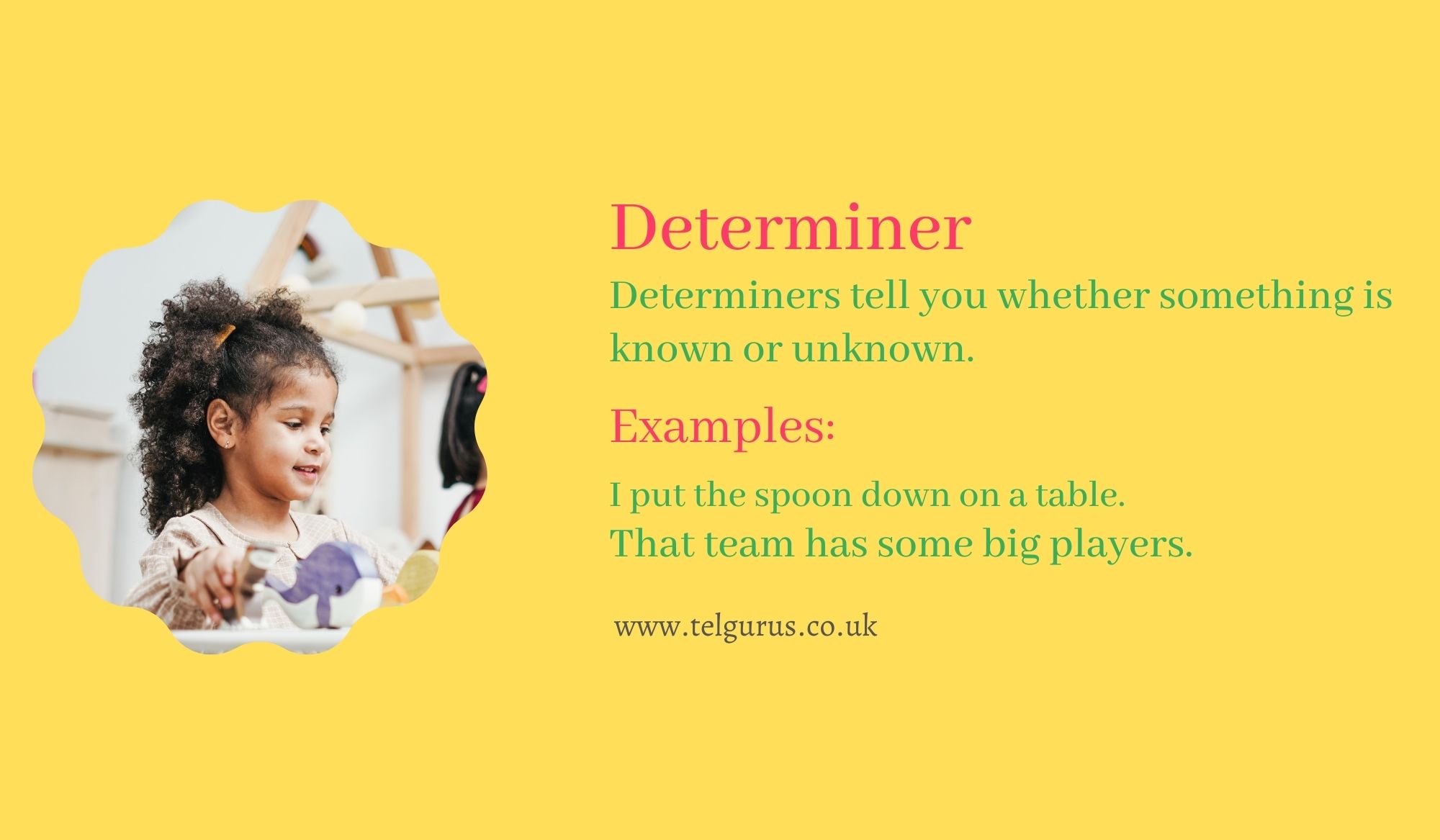Enrich your knowledge with our informative blogs
What is a determiner in English?

A determiner, also known as a pronominal modifier, is a word or a group of words that identifies, quantifies, or specifies the noun phrase or noun that follows it. A determiner generally comes at the beginning of a noun phrase and tells more about what comes after it.
Determiners contain articles (a, an, the), ordinal numbers (first, second, third), cardinal numbers (one, two, three), quantifiers (most, all, others), demonstratives (this, that these, those), partitives (a piece of, some of, others), possessive determiners (my, his, her, your, our, its, their) and difference words (other, another)
Robert Funk and Martha Kolln describe determiners as
Determiners signal nouns in several ways like
- They may define noun’s relationship to the listener, speaker, or reader
- They may qualify it specifically to quantity in general.
- They may identify nouns as general or specific.
Book Your 60-minutes Free Trial class NOW!
The two main kinds of determiners include specific and general.
Using a specific category refers to something specific like his, my, his, her, etc.
For instance,
My dog was sleeping all day.
While talking about the general ones, these do not refer to the specific ones and include general only. Some general words are many, a, an, what, other, etc.
For instance, many dogs were barking last night.
It is also common to get confused sometimes by the words that act as determiners sometimes and sometimes as pronouns. Wondering what?
For instance,
The word “that.”
– Sentence 1
That book is mine.
Here “that” is referring to a book, so it is a determiner.
– Sentence 2
Give me that.
Here that refers to a pronoun as it replaces a noun.
Book Your 60-minutes Free Trial class NOW!
Besides this, determiners are further divided into several kinds based on their meanings.
There are eight classes of determiners: This includes,
– The indefinite article
The indefinite articles are used with singular countable nouns. The indefinite article includes a or an.
For instance,
A man came into the shop.
– The Definite article
The definite article is used with both singular and plural nouns. It is not confined to countable or uncountable nouns and can be used with both of them. The definite article includes “the ” article.
For instance,
The dog chased the rabbit.
– The demonstratives
Demonstrative determiners are used to specify the distance of something in time or space concerning the speaker. The demonstrative determiners include this, that, those, these.
For instance,
This apple looks ripe.
Book Your 60-minutes Free Trial class NOW!
– The possessives
Possessive determiners are used when a person wants to indicate who owns or is associated with a particular item. The possessive determiners include my, his, her, your, our, their.
For instance,
This is my book collection.
– The quantifiers
Quantifiers are used to indicate the quantity or amount of something that is referred to by a noun. But these are different from the numbers as they do not indicate an exact amount. The quantifiers include some, enough, any, several, much, most, a few, many, half, double, both, no, all, enough, less, a little, least, fewer.
For instance,
Can I have some chips?
– The Numbers
The numbers are of two common kinds.
One is the cardinal numbers that are used in all forms of counting, which involve a total. The cardinal numbers include one, two, three.
For instance,
One chair
A hundred people
Another is the ordinal numbers that are used to talk about where something is placed in an ordered sequence. Ordinals are formed by adding the “-th” to the cardinal number.
For instance,
The company has just celebrated its fiftieth anniversary.
– The Distributives
The distributives are the determiners that are used to talk about something that is divided or shared out. The distributives include each, either, neither, every. These are generally used with singular nouns.
For instance,
I remember every detail about it.
– The exclamative
The exclamative are used to introduce an exclamation of admiration, surprise, or some similar emotion. The exclamative includes what, such.
For instance,
What a pleasant surprise!
Practice every type well and make examples for every type to get a stronger command over Determiners in English Grammar.
Read More – English Questions
View More – Useful links for Your Child’s Development

Let your personality sparkle when you speak!
Lead, communicate and achieve higher when you explore the world of opportunities with strong English concepts at TEL Gurus.
Categories
Recent Posts
- List of the qualities you should look for in your tutors?
- What is the most useful formulas in math?
- Describe the process of eating to defecation of food?
- Difference between the natural and artificial active response by the immunology system.
- Explain the different circle theorems
- How are nerve cells adapted to their function?










